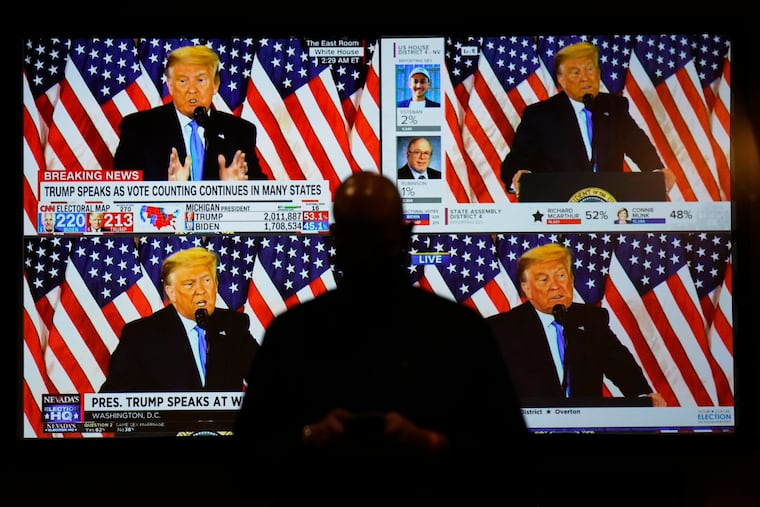Inside the lawyerly sleight of hand behind Trump’s efforts to overturn the 2020 election
A new book by an attorney who practiced law in Philadelphia for 50 years helps break down the full culpability of Trump’s plotters.

When Matt Teague and I wrote The Steal in 2021, a book that examined how Donald Trump tried to overturn the 2020 election, it was clear that the effort involved three kinds of people.
First was the “army” of true believers, who swallowed whole Trump’s claim that he had, in fact, won, despite the actual vote count. They took to the streets and social media by the thousands, threatening election officials and manufacturing a seemingly endless stream of wild conjecture about how Democrats (and willing Republicans) had stolen their victory.
Second were the “partisans,” Republican officials, lawyers, and media propagandists who, out of zeal or self-interest, echoed these baseless claims, filed groundless lawsuits, and, in some cases, directly attempted to alter the vote count and certification.
Third were the “plotters,” the small group of legal conspirators who coordinated the assault and who orchestrated an unprecedented scheme to derail the certification process.
Our book was written hastily over five months in 2021 and was published in hardcover on the first anniversary of the Jan. 6, 2021, assault on the U.S. Capitol Building. It necessarily focused on the public acts of Trump, his “army,” and his “partisans.”
A paperback edition published this year records the criminal and political reckonings for hundreds of them and reports the largest libel award in U.S. history against Fox News, Trump’s most prominent media ally. But it has only been more recently that federal and state prosecutors have unearthed the full culpability of Trump’s plotters.
To understand what they were up to, it helps to have a trained legal mind. This is what David H. Moskowitz brings in his newly published, slender volume, The Fake Elector Playbook.
Moskowitz practiced law in Philadelphia for 50 years and has been writing a series of books about legal philosophy called The Judge and the Creative Positivist. His wife, Marian, is the Democratic chairperson of the Chester County Board of Commissioners.
In plain language, Moskowitz explains how the 2020 plot unfolded. It was much more centrally conceived and directed than we knew two years ago.
The scheme preyed on our archaic Electoral College process, by which instead of simply reporting election totals, states certify “electors” to formally present the outcome to Congress.
The Trump plotters, led by Kenneth Chesebro, a Harvard-educated lawyer, and Stefanie Lambert, a Detroit defense attorney, created secondary slates of unauthorized electors in seven battleground states that Joe Biden won, including Pennsylvania.
The idea was to confuse the certification process enough for the Senate to find the outcome uncertain and ultimately to have Biden’s victory overturned. Trump’s electors filed papers purporting to be the certified representatives of their states, which they were not.
Moskowitz draws a critical distinction. In Pennsylvania and New Mexico, legal advisers wisely inserted a caveat — the Trump electors would be valid only if a court ruled in favor of their candidate’s legal challenges. None did. That careful step avoided criminal trouble for those state’s faux electors — Moskowitz calls them “alternates.”
Not so those from Georgia, Arizona, Michigan, Nevada, and Wisconsin, many of whom have now been criminally charged. These, Moskowitz says, are clear-cut “fakes.” They signed and filed legal documents purporting to be something they were not.
“The bottom line is that all of the fake electors were active in Republican politics, but some were not lawyers,” Moskowitz says. “The lawyers who advised them knew, and there is little doubt about this, that the fake elector playbook was not based on established legal rules but required that the fake electors commit criminal acts. The Republican lawyers knew or should have known that they were asking the fake electors to commit a crime.”
Indeed, Chesebro has already pleaded guilty in Georgia and has been meeting with prosecutors in various other states. Lambert has been criminally charged in several states. She, along with the disbarred Rudy Giuliani, Trump’s most famous attorney, is one of many lawyers who, writes Moskowitz, “were sucked into this opportunity to become famous or wealthy by getting involved with Trump, only to end up with the potential loss of their licenses to practice law and possibly being sentenced to prison.”
So The Fake Elector Playbook serves as a cautionary tale to lawyers tempted to jump on Trump’s wagon this year, and to the country.
The Republican lawyers knew or should have known that they were asking the fake electors to commit a crime.
As Trump seeks to regain the White House, he still swears he won four years ago. As Kamala Harris put it during this month’s debate, he was “fired by 81 million people, and is having a difficult time processing that.”
Just as he did then, Trump is laying the groundwork to seize power if he loses the election. Despite the fates of Chesebro, Giuliani, Lambert, and others, there is little doubt he will find new legal talent to further his schemes.
In Moskowitz’s book and The Steal, his methods are spelled out clearly. We’ve been warned.
Mark Bowden, who spent 24 years as a staff writer at The Inquirer, is the author of more than a dozen books, including “The Steal: The Attempt to Overturn the 2020 Election and the People Who Stopped It,” with Matthew Teague.